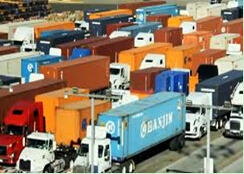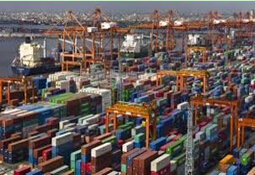U.S.A Federal Maritime Commission (U.S.FMC) is planning on publishing a new website to track congestion surcharges

NEWARK, New Jersey— The U.S. Federal Maritime Commission will launch a website soon that will serve as a clearinghouse & tracking center for port congestion surcharges, following industry confusion over planned U.S. West Coast surcharges, Commissioner Michael A. Khouri said today.
“The commission is gathering information from the carriers to compare announcements and actual tariff language to ensure there is consistency between language and implementation,”
The U.S. maritime commission is also reaching out to shippers, and carriers alike to inform them about the new tender rule requirements for cargo. The FMC has asked the TPS (Transpacific Stabilization Agreement) shipper advisory board to facilitate communications with shippers & carriers about the surcharges and work with them to find commercial resolutions to the congestion...
“That type of collaboration — if done well and the palms are up on both sides — can bring relief to the area,” he said.


More than 20 trans-Pacific carriers have individually agreed to hold off on imposing U.S. West Coast port congestion surcharges until next year, the FMC said on Dec. 4. A week earlier, at least 13 carriers had re-introduced port congestion surcharges for imports into the U.S. West Coast.
West Coat ports have been suffering from serious congestion issues in the last couple months of 2014 because of intentional slowing of productivity due to on-going longshore labor talks, near record cargo volume, lack of available trucks and the terminals’ inability to handle new mega-container vessels. Waterfront employers accuse the International Longshore and Warehouse Union of engaging in slowdowns, a charge the ILWU denies.
The FMC, Khouri said, did not receive specific agreements from any of the carriers to postpone imposition of port congestion surcharges. Instead, there was back-and-forth between the agency and individual carriers on what would “be best for the overall U.S. import-export economy,” he said.
The issue that came up regarding carriers’ planned West Coast congestion surcharges due to reduced labor productivity was whether they met the “clear and definite” requirements of FMC rules. Carriers have to show that there was a real reason for the need to charge some extra fees for the use of their services & vessels as well as give clear guidance on when the charges will be imposed. Shippers can rely on the prices not changing for at least 30 days.
“If the prices can be randomly changed at any time, you have a mess & the industry turns into chaos,” Khouri said. “The rules are meant to reduce chaos. The new rules & surcharges can not completely eliminate this chaos at the west coast terminals, but they can certainly help to reduce the congestion and chaos that is affecting west coast ports & terminals alike.
Source: www.fmc.gov
Questions / Comments? Contact:Mark@cmaritime.com.cn
HEADLINES
- Do shipping markets want Biden or Trump for the win?
- All 18 crew safe after fire on Japanese-owned tanker off Singapore
- Singapore launching $44m co-investment initiative for maritime tech start-ups
- Cosco debuts Global Shipping Industry Chain Cooperation Initiative
- US warns of more shipping sanctions
- China continues seaport consolidation as Dalian offer goes unconditional